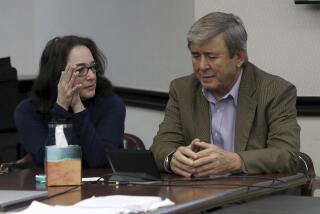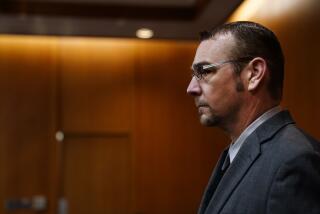2 Held Accountable for Son’s Burglaries
- Share via
In a singular test of increasingly popular parental responsibility ordinances being adopted across the country, a jury in the Detroit suburb of St. Clair Shores deliberated less than 15 minutes Thursday before convicting Anthony and Susan Provenzino of failing to control their 16-year-old son Alex.
Alex Provenzino had committed a string of seven burglaries while living in his parents’ home. The Provenzinos’ trial was the first under a 2-year-old St. Clair Shores ordinance that requires parents to “exercise reasonable control” to prevent their children from committing delinquent acts.
District Judge William Crouchman fined each parent $100, the maximum allowed, and assessed each $1,000 in court costs. The Provenzinos also could have been ordered to pay up to $27,000 in damages stemming from their son’s burglaries, but the judge found that section of the ordinance to be in conflict with state law, and so didn’t order a civil penalty. Individual homeowners victimized by Alex’s burglaries still can sue the family.
Dozens of communities and 10 states have adopted parental responsibility laws in recent years. Usually, though, authorities threaten parents with these measures rather than punish them. When the ordinances are enforced, parents almost always settle rather than fight. It was the Provenzinos’ decision to opt for a jury trial that made theirs a test case.
St. Clair Shores Police Detective Jack McFadzen, who initially proposed the town’s ordinance, expressed satisfaction after the verdict. “I didn’t care about the civil penalty,” he said. “I just wanted to get parents to pay attention and control their kids. I’m glad it’s over. We’re lucky to have a city council with enough guts to enact this ordinance. This was the first case up the flagpole, and it worked. It feels great.”
The parents’ lawyer, William Bufalino Jr., claimed the Provenzinos had urged Alex to get counseling, but were too terrorized by his verbal and physical abuse to force him to do so. “They are paying for the sins of their son,” Bufalino said. “They are not paying for their sins.” He noted that the Provenzinos, who have four children, already pay $155 a day for Alex’s incarceration. The youth is now serving a one-year sentence for burglary in a juvenile detention center near Saginaw, Mich.
It was unclear Thursday whether the Provenzinos will appeal the verdict.
McFadzen first confronted Anthony Provenzino, 48, a restaurant cook, and his wife, Susan, 44, a bookkeeper at a bank, after Alex was involved in three break-ins at St. Isaac Jogues Church in May 1995.
McFadzen urged the father to “take control of your child. . . . The house belongs to you, not him. Make him follow your rules.” During a conference at the police station, he also warned Provenzino about the town’s parental responsibility law: “You could end up in front of a judge explaining why you let your son smoke dope and drink beer in the house, then go out and break the law.”
Fifteen days later, Alex--who at 6 feet towers over his diminutive father--attacked Anthony Provenzino with a golf club during an argument. Then Alex embarked on a second round of burglaries, this time at nearby homes. Late last year, he pleaded no contest to the burglaries and drew a one-year sentence in a youth home.
In early January, authorities in St. Clair Shores--a blue-collar, working-class town of 68,000--decided Anthony and Susan Provenzino provided an ideal test case for their parental responsibility ordinance.
“I think this was a vote in favor of the family and a vote in favor of parental responsibility,” Robert Ihrie, the city attorney, said at the end of the three-day trial. “This isn’t about what the child did. We charged the parents for their own conduct. For what they failed to do. They essentially shrugged their shoulders and said, ‘Gee, we didn’t know anything about this.’ ”
That, in fact, is exactly what both the parents and their son maintained at the trial.
Alex, called to the stand in defense of his mother and father, testified that he was so “sneaky” his parents never knew of his crimes. “I tried to hide what I did and stuff because I knew they would be upset . . . I like my privacy and they know that.”
Anthony Provenzino testified he did his best with the boy, but also admitted to some shortcomings. He held the justice system partly responsible for failing to keep his son in custody longer the first time he was arrested.
At the trial’s end, he called the verdict “terribly painful.” He urged other parents “to do the best they can in raising their children. I don’t know what else you can do.”
In one form or another, generally worded statutes making parents liable for their children have been on the books for decades. What distinguishes the newer round of ordinances are its rigorous penalties and far-reaching definitions of parents’ obligations.
A mounting chorus of critics, including various law professors and the American Civil Liberties Union, has argued that most of the ordinances are unconstitutionally vague and broad, as well as unworkable. But the measures have gained particular momentum in the last two years. Many jurisdictions have levied fines or ordered parents to attend classes and do community service; a few have jailed parents briefly.
More to Read
Sign up for Essential California
The most important California stories and recommendations in your inbox every morning.
You may occasionally receive promotional content from the Los Angeles Times.










